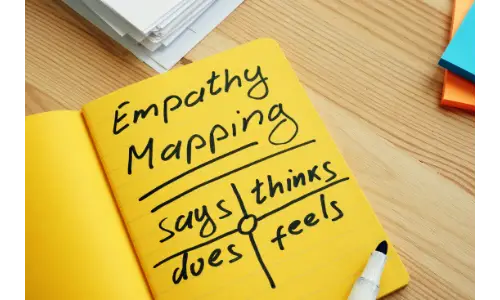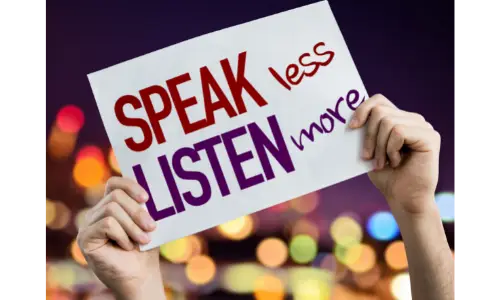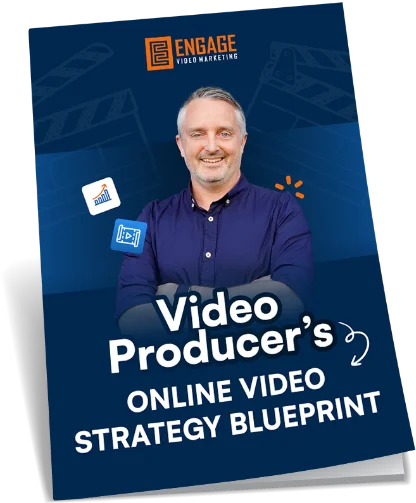What is the number one trait for good video marketers? That’s what we’ll find out in this article.
After 12 years running my video production company, more than 7 years as a video marketer and now having worked with and trained over 100 other video marketers in my Online Video Strategy Blueprint Course, I believe there is one key trait that every good video marketer needs to be successful. The good news is that it comes naturally to some. The even better news – it’s a skill that can 100% be taught and practised.
So, what is the number one trait? Well, I believe it’s… Empathy.
Empathy. Yep – the ability to understand how someone else feels.
You see, in video marketing the goal is to create and use video content in a way that moves someone to take a desired action. And in order to move someone, they need to care enough about the benefit that taking that action will have in their lives. And it’s our role, as video marketers to work to understand that desire, and use it to our advantage.
When a video marketer develops real empathy for their target audience the strategic action to take becomes clear.
The key to empathy is remembering that it’s not about how you would feel in the other person’s shoes, but how the other person feels in their shoes. To put yourself in someone else’s shoes is to consider the other person’s perspective. This is what psychologists call cognitive empathy or actively thinking about how your target audience feels or thinks in any particular situation.
There are often two other types of empathy that psychologists refer to as well.
Emotional Empathy is when you quite literally feel the other person’s emotions alongside them, so much more subconscious. And then there’s Compassionate Empathy which is about feeling and recognising someone’s pain and then taking action to help.
But in marketing… it’s the skill of Cognitive Empathy that is an undeniable secret weapon.
So, how can you practise cognitive empathy in your work and develop video marketing strategies with empathy at the core?
Well, let me share with you three of the best approaches I usually take.
#1 Develop detailed customer personas or avatars.
Design a crystal clear profile of who it is that you’re trying to reach through your video marketing. Their demographics (who are they), psychographics (or what’s going on in their head), and a behaviour profile (or where to they go and what do they do online). I went into more detail into this process in a previous blog – you can check that out by clicking the link here – How to Find Your Target Audience for Video Marketing
#2 Develop an Empathy Map
Next, I like to take this avatar process one step further and work with my clients to develop an empathy map for their avatar with respect to the product or service that we are marketing.
An empathy map is typically divided into four quadrants with the customer in the centre. We then label each quadrant into the following:
- What a customer Says,
- What a customer Thinks,
- What a customer Does and,
- What a customer Feels.
Then, working with your client it’s time to map out what we know about the ideal customer in each of these quadrants. For example in the weight loss recipe book example in the ‘What a customer says’ quadrant we include specific words that we know our customers say about weight loss and cooking such as;
- “I’m too busy to cook from scratch” or
- “My family won’t eat that type of food” or
- “I’ve always cooked food in this way”
Next we move to the THINKS quadrant, and might include things like;
- “I’m never going to be a size 10 again” or,
- “It’s not fair that she can eat whatever she likes” or
- “I want my kids to grow up healthier than me”
And we carry on with the mapping exercise including statements about what a customer DOES and what a customer FEELS to really round out the full empathy map.
I strongly encourage you to give this exercise a try either with your clients, or for your own business and see what valuable insights are uncovered for your marketing.
#3 Listen
Okay – and my final tip for empathic video marketing is to remember that you’ve got two ears and one mouth so LISTEN… much more than you speak. Really listen when interviewing customers or your clients, hear what matters to them, and how they speak about it.
Record these conversations, collate this data and use this information to iterate your video content or strategy to better align with your intended audience.
Remember in life and in marketing meaningful connections are forged for mutual understanding. Brands who show empathy in marketing show their customers that they understand and care about them, and in turn customers understand and care about emphathetic brands.
How are you practising empathy in your video marketing? Or is this something you need to get better at doing?





